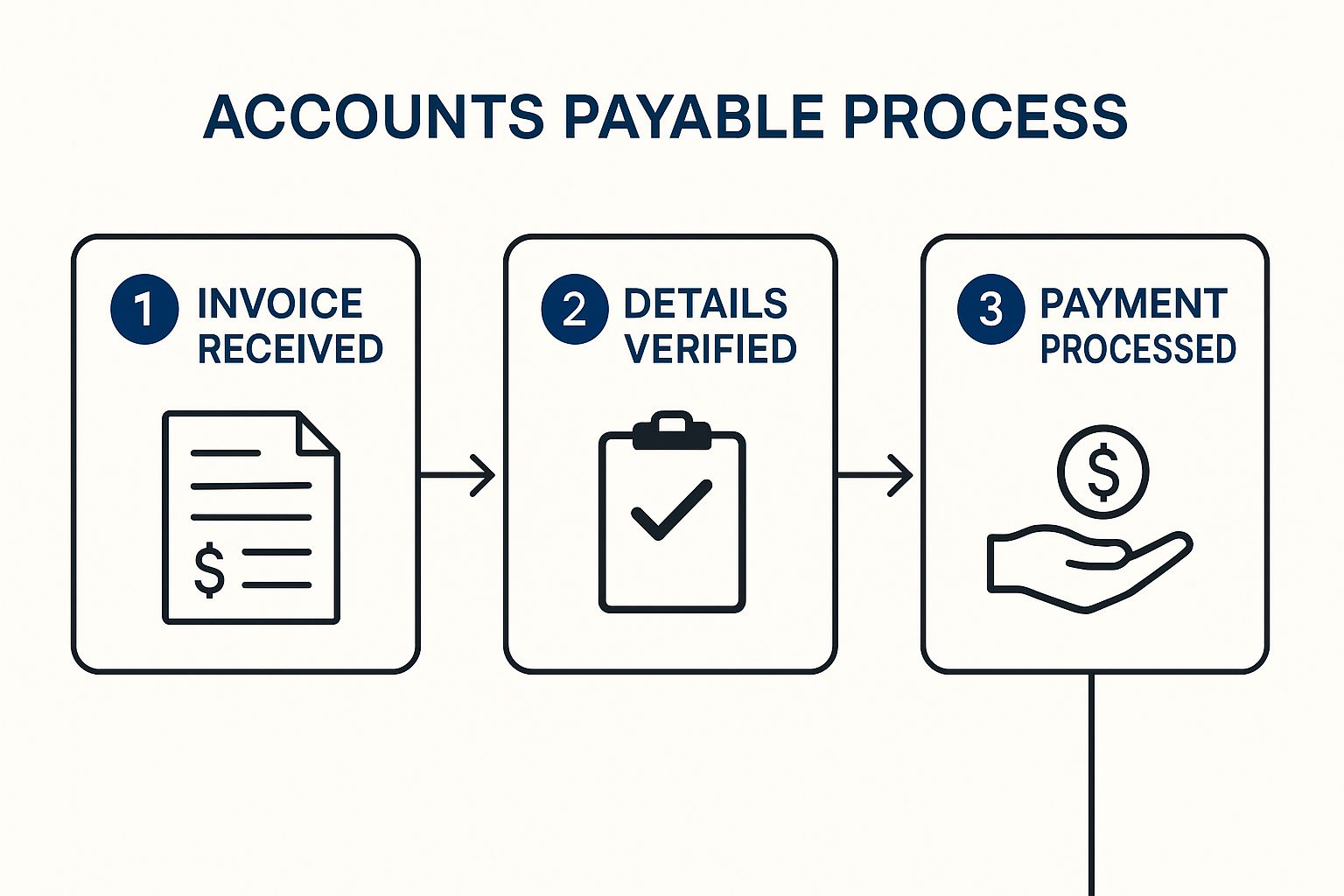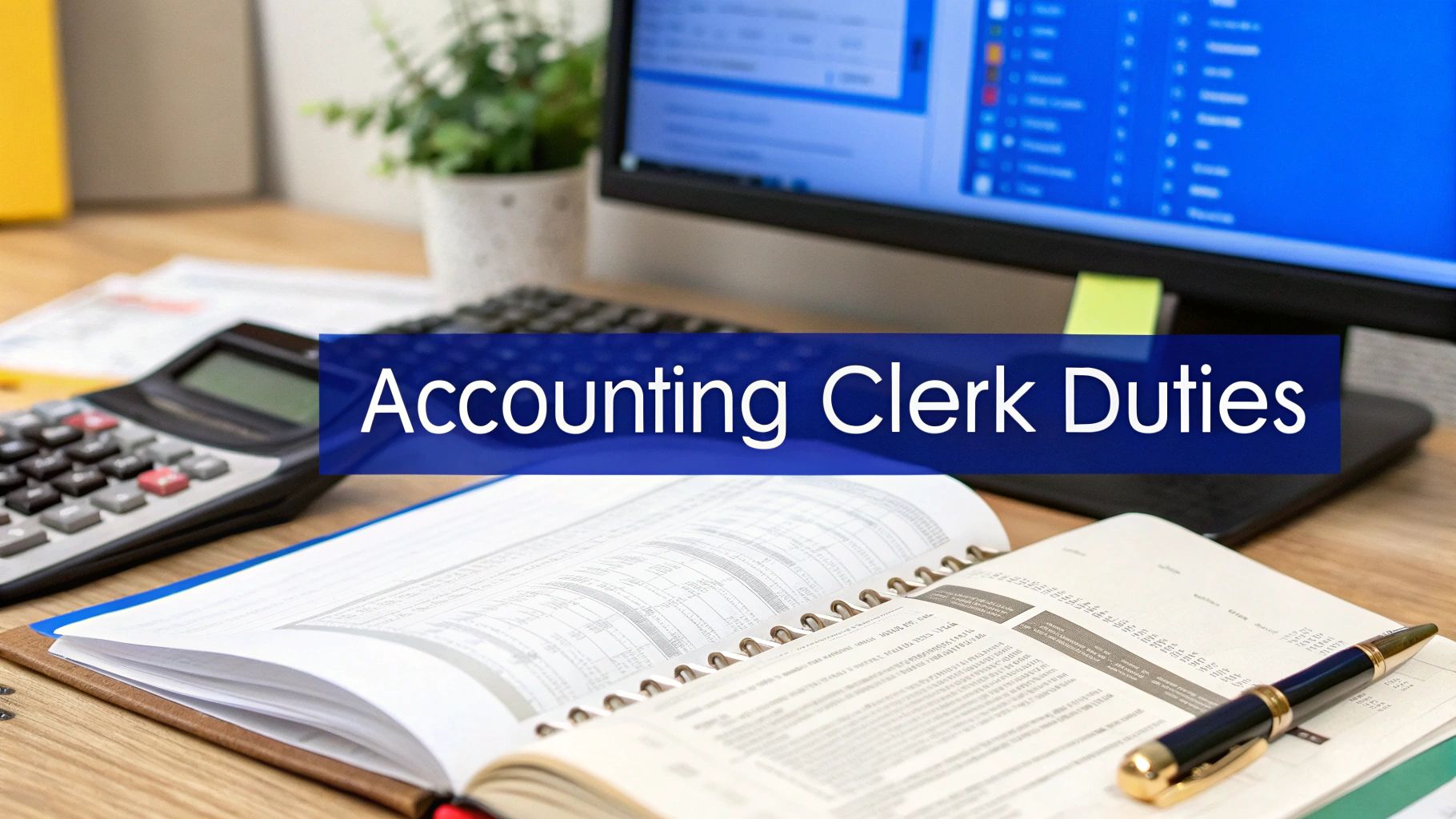Accounting clerks are the unsung heroes of the finance department. They're on the front lines, handling the day-to-day processing of accounts payable and receivable, meticulously reconciling bank statements, and keeping the company's financial records in perfect order. Essentially, they ensure every single transaction is accurately recorded and verified, forming a reliable foundation for all other financial activities.
What Does an Accounting Clerk Actually Do?
Think of an accounting clerk as the financial air traffic controller for a business. They aren't flying the jumbo jet (making major financial decisions) or designing the airport (setting the company's financial strategy). Instead, they are the ones on the ground, masterfully managing the constant flow of take-offs and landings—all the invoices, payments, and expenses—that keep the whole operation running without a hitch. Without their careful watch, things would get chaotic, fast.

This role is truly the operational heart of any finance team. Accounting clerks are responsible for the daily tasks that guarantee financial data is accurate, current, and properly organised. Their work is the bedrock upon which senior accountants and financial managers build their strategic reports and analyses.
The Financial Gatekeepers
At its core, the job is all about managing the essential ledger accounts. This includes everything from accounts payable and accounts receivable to handling all the cash documentation. In the UK, this role is absolutely vital for maintaining a company's financial health and ensuring it stays compliant with regulations.
The average salary for an accounting clerk in the UK is around £22,087 per year, according to data from PayScale. For those just starting out, positions typically begin closer to £16,335. As you gain experience and take on more responsibility, that figure can climb to around £27,000, showing a solid path for growth in both career and salary.
The accounting clerk is the first line of defence against financial errors. Their attention to detail in processing invoices and reconciling accounts prevents small discrepancies from snowballing into major problems.
To give you a clearer picture of what the role involves day-to-day, the table below provides a quick snapshot. It breaks down the primary responsibilities, essential skills, and the typical environment you can expect to work in.
The Accounting Clerk Role at a Glance
This overview sets the stage for a deeper dive into the specific duties that truly define the profession of an accounting clerk. It’s a role that demands precision, but for the right person, it’s an incredibly rewarding and stable career choice.
A Breakdown of Core Accounting Clerk Duties
To really get a feel for what an accounting clerk does, you have to look past a simple job description. It’s all about the daily rhythm of the work. Think of it like this: the core duties are two sides of the same coin, managing the money coming in (Accounts Receivable) and the money going out (Accounts Payable).
These two functions are the lifeblood of any business, and the accounting clerk sits right at the heart of it all, making sure everything flows smoothly. They aren't just paper-pushers; they're more like financial detectives, making sure every single transaction is accurate, justified, and recorded in the right place. Their work is a crucial chapter in the company's financial story.
Managing Accounts Payable
The Accounts Payable (or AP) side of things is all about paying the company’s bills correctly and on time. It all kicks off the second a supplier's invoice lands on their desk (or in their inbox).
First up, the clerk has to verify everything. Did the company actually receive the goods or services? Are all the details on the invoice—the amount, the date, the supplier info—spot on? This is a vital checkpoint to stop overpayments or even fraudulent charges in their tracks.
Once everything checks out, the invoice gets coded to the right expense account in the general ledger and is then scheduled for payment. It's a meticulous process, but it’s what ensures company money is only spent on legitimate business expenses. For a deeper dive into this area, our guide on the https://www.beyondhire.co/blog/accounts-payable-job-description offers some great insights.

As you can see, this structured approach is key to maintaining tight financial control and making sure every payment cycle is accurate.
Overseeing Accounts Receivable
On the flip side, you have Accounts Receivable (AR), which is all about making sure the company gets paid by its customers. An accounting clerk is the one who generates and sends out customer invoices promptly. Accuracy here is everything; a mistake on an invoice can easily lead to payment delays and put a strain on customer relationships.
But the job doesn’t stop once the invoice is sent. A huge part of AR is collections. The clerk tracks all the outstanding invoices and follows up on any that are overdue. This takes a delicate touch—you have to be professional and persistent to collect the funds, all while keeping a good rapport with the customer. To get the full picture, it's helpful to understand concepts like what a chargeback means in an accounting context, which comes into play when customer payments are disputed.
The Rhythm of the Role: Daily vs Monthly Tasks
The life of an accounting clerk has a distinct rhythm, with some tasks happening every day and others on a weekly or monthly cycle. Understanding this flow helps clarify how they manage their time and priorities.
Here’s a simple table to show you what that typically looks like:
Daily vs Monthly Accounting Clerk Tasks
This table gives you a snapshot of how the role blends immediate, reactive tasks with more structured, cyclical responsibilities. It’s a constant balancing act.
The Art of Reconciliation and Reporting
Beyond the daily back-and-forth of AP and AR, you’ll find the critical task of reconciliation. If you've ever balanced your personal bank account against your statement to spot any differences, you've done a reconciliation. The clerk does the exact same thing, just on a much bigger scale.
They meticulously compare the company's financial records against the bank's records, hunting down and resolving any discrepancies. This is usually done monthly and is absolutely essential for catching errors, spotting potential fraud, and confirming the company's cash balance is correct.
On top of that, accounting clerks are often called on to help prepare various financial reports. These might include:
- Aged Debtor Reports: Showing who owes the company money and for how long.
- Supplier Payment Summaries: Detailing every payment made to vendors over a period.
- Expense Analyses: Breaking down what the company is spending its money on.
These reports aren't just for record-keeping; they give management the clear, hard data they need to make smart business decisions. It's how a clerk’s daily work gets turned into real strategic insight.
The Skills You Need to Succeed and Excel
Knowing the daily duties of an accounting clerk is one thing, but having the right mix of skills is what really makes someone great at this job. To truly excel, you need a solid combination of technical expertise (hard skills) and the right personal qualities (soft skills). These aren't just buzzwords to pad out a CV; they're the practical abilities that keep the financial gears of a company turning smoothly and accurately.
Think of it like being a master chef. You need the right knives and pans (the hard skills), but you also need the finesse, timing, and intuition (the soft skills) to create a fantastic meal. If one part is missing, the final result just won't be the same.
Essential Hard Skills for Accuracy
Hard skills are the concrete, teachable abilities you pick up through education and on-the-job training. For an accounting clerk, these are absolutely fundamental—the bread and butter of your daily work.
- Accounting Software Proficiency: You’ve got to be comfortable with the main accounting software packages used across the UK. This means getting to grips with platforms like Sage, Xero, and QuickBooks. Most employers will expect you to hit the ground running, processing invoices and pulling reports without needing your hand held.
- Advanced Excel Skills: While dedicated accounting software does a lot of the heavy lifting, Microsoft Excel is still the secret weapon in any finance professional's arsenal. Being a dab hand at functions like VLOOKUPs, Pivot Tables, and SUMIFs lets you slice and dice data, create bespoke reports, and spot inconsistencies that software might otherwise miss.
- Numeracy and Bookkeeping Principles: A rock-solid understanding of basic bookkeeping is non-negotiable. This means knowing your way around double-entry accounting, what debits and credits really mean, and how every transaction impacts the general ledger.
These technical skills are the foundation. They ensure every penny is accounted for and every number is exactly where it needs to be.
Critical Soft Skills for Effectiveness
Your soft skills are just as important. They dictate how well you use your technical knowledge and how you interact with the rest of the team. In a job where a single misplaced decimal point can create a world of problems, these attributes are what prevent small mistakes from becoming big headaches.
Attention to detail isn't just about being tidy. It's an active mindset of checking every figure, questioning anything that looks off, and making sure the financial records are a perfect mirror of the business's reality. It's the one skill that protects a company’s financial health day in and day out.
Here are the key soft skills that make a difference:
- Meticulous Attention to Detail: This is probably the most critical soft skill of them all. It's the difference between paying an invoice for £1,000 and accidentally paying one for £10,000. It's about triple-checking supplier details, verifying amounts, and making sure every bit of data is spot-on.
- Strong Organisational Skills: An accounting clerk is always juggling. One minute you're handling daily data entry, the next you're deep in monthly reconciliations. You have to be able to prioritise your workload, manage deadlines, and keep your records immaculate, especially during chaotic times like month-end.
- Effective Communication: You'll be talking to suppliers about getting paid, chasing customers for invoices, and flagging issues with colleagues. Communicating clearly and professionally—whether in an email or over the phone—stops misunderstandings in their tracks and helps build good working relationships.
- Problem-Solving Abilities: When the bank statement doesn't match your records or an invoice seems wrong, you can't just ignore it. You need the initiative to dig in, find out what went wrong, and figure out how to fix it.
Developing these skills doesn’t just make you a better clerk; it makes you a more valuable part of the team. This is a huge factor for businesses figuring out how to improve employee retention. After all, a reliable and skilled clerk is an asset no finance department wants to lose.
Your Career Path After The Clerk Role
The accounting clerk role is a fantastic way to get your foot in the door of the finance world, but it’s rarely the final stop. Think of it as your apprenticeship; you’re on the ground floor, learning the real-world mechanics of how a business’s finances tick. The skills you’re mastering—from managing ledgers and processing transactions to ensuring every penny is accounted for—are the absolute bedrock of a long and successful career.
This hands-on experience is incredibly valuable. Every senior accountant, finance manager, or controller started out by getting to grips with the basics that form the core of an accounting clerk's job duties. This position isn’t a landing strip; it’s your launchpad.

Stepping Stones To Advancement
After a couple of years of solid experience, you’ll find several clear career paths opening up. Each one builds directly on the foundation you’ve so carefully laid as a clerk.
- Accounts Assistant: This is often the most direct next step. You’ll start handling more complex tasks, maybe getting more involved in the month-end close process or preparing more detailed financial reports for management.
- Bookkeeper: If you find you enjoy owning the entire financial picture for a smaller company, bookkeeping is a natural fit. You'll manage all of the company's books, from daily entries right through to producing the initial financial statements.
- Part-Qualified Accountant: This path means pursuing professional qualifications like the ACCA (Association of Chartered Certified Accountants) or CIMA (Chartered Institute of Management Accountants). Your clerk experience gives you the practical context that makes your studies click into place.
The move from clerk to a more senior role is all about your ability to shift from transactional work to analytical responsibilities. It’s about going from recording what happened financially to interpreting what it means for the business.
Fuelling Your Growth
To make these jumps, you need to be hungry for development. Don't just process invoices; ask why they're coded a certain way. Aim to master your accounting software beyond the basic functions until you’re the go-to expert on the team.
The salary trends in the UK show a clear financial reward for this progression. While an accounts assistant might earn between £26,200 and £28,600, bookkeeping roles often command a slightly higher range of £28,000 to £31,600. These figures show how much more value is placed on your expertise as you climb that career ladder. When you're ready to explore these new opportunities, it helps to have some solid tips on how to change careers successfully. Planning your next move with care can make all the difference.
Finding the right support is also key to navigating your career path. For expert guidance on landing your next role, check out our guide on finding the best accounting staffing agencies. With the right strategy and a real commitment to learning, the accounting clerk role is the perfect first step toward a brilliant future in finance.
How Technology Is Reshaping the Job
The role of an accounting clerk is going through a massive—and frankly, exciting—overhaul, all thanks to technology. Far from making the job disappear, automation and artificial intelligence (AI) are actually making it more interesting. The focus is shifting away from mind-numbing manual tasks towards more meaningful analytical work.
For any clerk who has spent hours manually punching in invoice details, the change is a breath of fresh air. Now, Optical Character Recognition (OCR) software can scan, read, and populate those fields in seconds. This frees you up to investigate bigger questions, like why a supplier's costs have suddenly jumped by 15% or spotting a pattern of late payments from a certain group of clients.
From Data Entry to Data Analysis
This evolution is pushing the core of accounting clerk job duties up the value chain. Instead of just being processors of information, modern clerks are becoming its first line of analysis. Your job becomes more about exception handling—managing the unusual transactions that automated systems flag—rather than touching every single one.
This new reality puts a huge premium on digital literacy and being able to adapt. Simply knowing your way around accounting software isn’t enough anymore. The clerks who truly stand out are those who can work with automation tools, understand data workflows, and make sense of system-generated reports. To see this in action, checking out some real-world business process automation examples can really open your eyes to what’s possible.
UK Economic Trends and New Opportunities
This technological shift is happening at the same time as some big changes in the UK economy. Businesses are pouring money into transforming their finance departments, which has created a surge in demand for accounting professionals who can get these new systems humming.
In fact, the demand for finance professionals has shot up by 17% across commercial sectors. We’re seeing massive growth in regions like the South West (47%) and Yorkshire and the Humber (37%). As more companies go digital, roles that blend classic accounting skills with a bit of tech savvy are becoming the new standard.
The modern accounting clerk is less of a bookkeeper and more of a financial detective. Technology provides the clues, but it still takes a sharp human mind to connect the dots, solve the puzzles, and safeguard the company’s financial integrity.
At the end of the day, technology is making the accounting clerk role more engaging and strategically important than ever. It's no longer just about keeping the books straight; it’s a career path that offers a real chance to contribute to a company's financial intelligence.
Common Questions About the Accounting Clerk Role
Jumping into any new career path is bound to stir up some questions. What are the day-to-day hurdles? How is this role different from a bookkeeper? Let's tackle some of the most common queries we hear from aspiring clerks to give you a real-world feel for the job.

Think of this as your practical FAQ, designed to clear up any uncertainties and paint a clear picture of what you can really expect as you start your journey in this vital financial role.
What Is the Biggest Challenge for an Accounting Clerk?
If you ask any seasoned clerk, they'll likely tell you the biggest challenge is the constant balancing act between speed and precision. You’re often dealing with a high volume of transactions and tight deadlines, but there is absolutely no room for error. A single misplaced decimal can cause a world of trouble.
The month-end close is a classic example of this pressure cooker environment. It’s when your organisational skills and ability to stay focused under pressure are truly put to the test. The trick is to build smart, efficient workflows and really get to grips with your accounting software to automate as much as possible, leaving you more time for the critical review work.
Is an Accounting Clerk the Same as a Bookkeeper?
It’s a common point of confusion, but no, they aren't quite the same. While the roles overlap, an accounting clerk often specialises in a specific slice of the financial pie. You might be the go-to person for accounts payable or solely responsible for accounts receivable.
A bookkeeper, especially in a smaller company, tends to be more of a generalist. They usually manage the entire set of financial records from start to finish, handling all the ledgers and often preparing the initial financial statements.
A simple way to think about it: clerks are often specialists within a larger finance team, while a bookkeeper is the all-rounder who manages the entire record-keeping process.
How Can I Stand Out When Applying for Clerk Jobs?
To get your CV to the top of the pile, you need to show your impact, not just list your duties. Numbers speak louder than words.
- Instead of writing "Managed invoices," try something like "Processed 300+ supplier invoices weekly with 99.8% accuracy." This gives a hiring manager a tangible sense of your capability.
- Be specific about the tools you know. Highlighting your experience with UK-centric accounting software like Sage, Xero, or QuickBooks is a huge advantage.
- Don't just say you're good with Excel. Mentioning skills like creating Pivot Tables or using VLOOKUPs proves you can handle data efficiently and go beyond basic data entry.
And, of course, a relevant qualification like being AAT-qualified or part-qualified is an immediate signal to employers that you’re serious about your accounting career.
Do I Need a University Degree?
Not necessarily. In the UK, a university degree isn't always a must-have for an accounting clerk role. Many employers actually prioritise practical skills and vocational qualifications, like those from the Association of Accounting Technicians (AAT).
Strong GCSEs in Maths and English are usually the foundational requirement. While a degree can certainly open doors for senior finance roles later on, you can absolutely build a successful and rewarding career by starting with on-the-job training and professional certifications.

